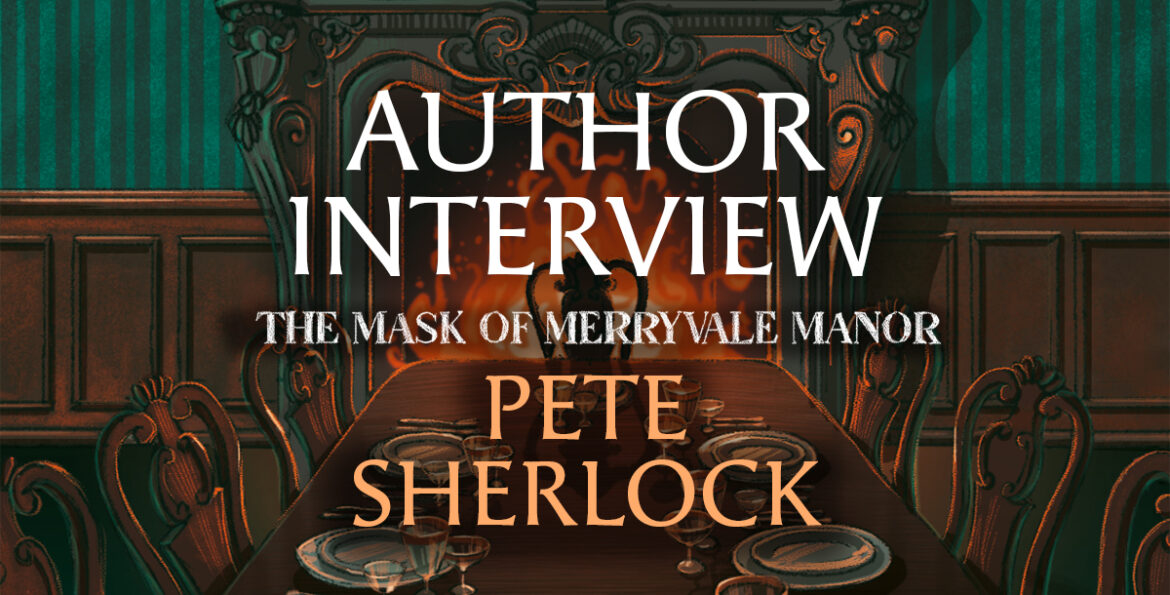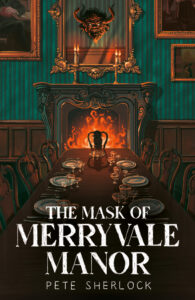

Interview with Pete Sherlock and an exclusive extract
- 20th June 2024
- Category : Author,Blog,Interviews & Blogs
Pete Sherlock is a Birmingham based investigative journalist at the BBC. His debut novel, The Mask of Merryvale Manor published 20th June 2024 and follows the wonderfully flawed Drummond family. Read our interview with Pete about authorship and his novel The Mask of Merryvale Manor below!
What’s a piece of advice you can give to aspiring authors?
Don’t try and do it alone. Find a writer’s group, or a trusted friend, or loved one; and then share everything: the things you know work, the things that suck. A regular feedback process reduces the risk of spending however many months setting off down the wrong track. I was on a writing course, which involved peer feedback on 2,000 words every fortnight. It was invaluable.
So many of my writer friends say few people know about their writing selves including friends, family and colleagues. I was the same, almost treating writing as a shameful secret, which definitely isn’t the case with knitting, running or yoga.
So my advice would be to find people with a similar secret; and share everything. When you find your confidants, a lot of the insecurities fall away.
What’s your favourite book and who is your favourite author?
My favourite author is Richard Powers, who is often referred to as “the greatest novelist you’ve never heard of”. His book, The Overstory, changed me in ways I’m still attempting to understand. It’s about nine characters who converge on California in the 1990s to protest about the felling of giant redwoods. There’s an extended scene where two characters – Nick and Olivia – spend a year living in a giant redwood they call Mimas. As the months go by, everything about their former lives drop away, and they tune into something raw, ineffable, and real. The book is a plea for a different future for humanity: one that is slower, humbler and ego-free. I think about it all the time.
How did you start writing and what does it mean to you?
The answer to the question, ‘what do you really want to do?’ has always been to write fiction. When I was a kid, my mum used to take me to the library on a Friday afternoon. I’d max out my card with six books, and when we got home, I’d take them to my bedroom with a glass of milk and a chocolate bar, and I’d read all evening. I’ve been obsessed with storytelling ever since.
Do you have any habits or rituals to get you in the mood for writing?
I wrote the novel perched in a corner of a Turkish café in Harborne High Street, the suburb of Birmingham where I live. They do incredible avocado milkshakes, the price of which assuaged some of the guilt of occupying a table for hours on end. Having a writing destination helped. Once inside, I adopted the writing mindset.

The Mask of Merryvale Manor is your debut novel, what inspired you to write this novel?
I’m primarily inspired by goth-lit, stories with a black heart that get under the skin. Writers like Daphne Du Maurier, Iris Murdoch and Donna Tartt. Gripping stories with a rich character cast. There’s a Murdoch novel called The Philosopher’s Pupil that opens with a married couple arguing as they drive home, and I couldn’t believe the dialogue: it absolutely fizzed with venom. I knew I wanted to sit within this genre, whatever it may be. It took me a while to find my voice. I went down the mistake of reading a brilliant book, and then subconsciously attempting to mimic its style. It’s why I now tend to stick to reading non-fiction when I’m writing.
What’s the most surprising thing you’ve learned through writing The Mask of Merryvale Manor?
I’ve learned that no matter how many times you read your draft manuscript, a top-class editor will spot something you’ve missed, like pointing out the psychoanalytic term a character refers to was not in common parlance until at least a decade later. That is to say, I’ve learned that, once you close your laptop for the final time, it becomes a team effort. I’m hugely grateful to the brilliant and supportive team at Fairlight Books.
You’ve created an eclectic cast of characters, do you have a favourite character (or a character you love to hate)?
I’m very fond of The Drummonds, but if I had to choose one it would be Rupert. He is determined to preserve his family life at Merryvale Manor, and goes about the task with a spirited defiance as the net closes in. He’s never been a hero, and never will, and it’s this self-realisation during the course of the novel that lends him a degree of tragedy.
Is there any specific reason for the timeline of your story to be set in 1960s?
The Drummonds represent an old order, a way of life that’s dying. They’ve enjoyed their privilege for centuries, but the country around them is changing. The government is about to change; Harold Wilson is about to form a majority government of one. The sixties will soon swing. I wanted the timeframe to reflect their own loss of power and status.
What is one highlight of The Mask of Merryvale Manor that you would want the readers to take away?
I’d just like people to enjoy a good story where some deeply flawed characters make some terrible mistakes.
Could you explain the significance of ‘The Ooser’ within your story?
Everyone in the novel wears a mask to some degree. The Ooser, a mask used in punishment beatings centuries ago, reminds them of the pain of doing so. It represents shame and humiliation; and from its vantage point on the wall of Merryvale Manor, nothing escapes its gaze.
Do you think your experience as an investigative journalist had any contribution to the character development?
To some degree. It’s useful to be interested in what makes people tick; how desire conflicts with needs; power dynamics between groups of people; and their hidden motivations.
Can readers expect more of your work with a similar theme to The Mask of Merryvale Manor?
Yes, they certainly can. I’m interested in stories steeped in mystery with an underlying and pervasive sense of dread. I’m drawn to gothic settings, flawed characters and elements of folk horror. Stories that get in your bones.
*
Read an excerpt of The Mask of Merryvale Manor here…
Dorset, August 1964
The bride and I escaped from the marquee and took the path down the sloped lawn towards the wood. Natasha was tipsy and tactile, unconcerned by the Rubicon she had crossed. I was bitter and bruised. In the morning, she would drive to St Ives to spend her honeymoon in a cottage with a view of the bay. I would sulk at Merryvale Manor, haunted by the image of her husband’s fat white fingers fiddling with the buttons of her skirt.
We walked in silence, passing between us a bottle of blanc de noirs we’d snatched from the top table. Bess, the old black Lab, trotted ahead of us, her nose glued to the carpet of pine needles on the path. The air was fresh with the scent of wild mint and pine.
After a while, Natasha said, ‘Well, there we go – what’s done is done, I suppose.’ She had changed out of her wedding dress into a pair of black trousers and a brown cashmere jumper. Her short black hair was sleek and neat, and her face scrubbed free of make-up. ‘I wasn’t too glum for the photos, was I? I was trying my best to smile.’
‘You looked radiant,’ I said. It was close to midnight and we held on to each other, shivering a little. ‘Listen… can you hear the redwing make its seep-seep sound? Probably came all the way from Norway, poor fellow.’ I didn’t care much for the redwing, or anything for that matter, but I felt I had to change the subject; the more she spoke about the wedding, the more she seemed to deepen my despair.
Natasha linked her arm in mine. Her lips curled into a half-smile. ‘It’s poor form to take the bride into the woods on her wedding night, you know.’
‘I didn’t take you. You wanted to go for a walk.’
‘Oh, that makes it all right, then,’ she said, in a low whisper.
‘Just what will people think?’ She circled my palm with her thumb.
‘Oh, stop it,’ I said, pulling my hand free from hers. ‘I’m done with being teased. I’m done with all that now.’
Natasha stiffened. The playfulness of her teenage years had hardened into something crueller and more reckless. She said, ‘I was getting restless. They’re all terrible bores when they’re squiffy… and Charles keeps pawing at me.’
‘He’ll be looking for you.’
She bit her bottom lip and said, without sincerity, ‘Your girl seems sweet. I should imagine she’s looking for you.’
‘I should imagine she’s gone to bed. She’s got blotto on negronis.’
‘Oh, she’s gone to bed. I wish Charles would.’ She placed a cold hand on my chest. ‘Are you going to try and kiss me again?’
‘No.’
‘You can if you like.’
Her flippancy irked me. ‘You’ve just got married.’
‘I know, but it doesn’t really count.’
I snorted in disapproval.
Natasha’s fingers toyed with the top button of my shirt. ‘That’s why I brought you into the woods. I wondered what you’d do. Do you know, you’ve become a bit of a prig since you went to Cambridge? I hope you don’t mind me saying. It must be all that dreadful poetry you’re reading.’
‘I don’t mind.’
‘Mind being a prig, or mind me saying?’
I glanced over my shoulder at the wide old house, set at the top of the hill. Amber light glowed from the grid of rectangular windows. Something about Merryvale Manor’s rigid straight lines and imposing facade made me shudder. ‘I think we should turn back now. It’s too dark to go further,’ I said.
*
The Mask of Merryvale Manor is publishing on 20 June 2024. Order now from Blackwell’s, Bookshop.org or Waterstones.














